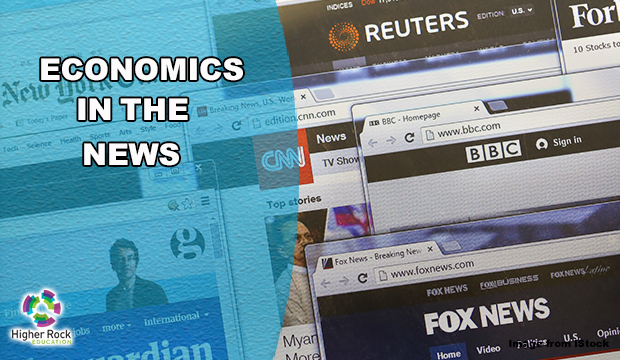
Economics in the News – Jan. 16-22, 2023
Economics impacts our lives every day. Below are some of the top storylines from this past week related to economics.
o As more companies adopt to digital payment methods, customers are being asked to leave a gratuity on a screen as high as 20, 25 or 30 percent. More consumers are becoming frustrated with the hounding for tips for simple purchases, such as a regular cup of coffee or a muffin at a bakery. Unlike tip jars, customers are unable to ignore the screen requesting gratuity and often feel social pressure to leave a tip. On top of that pressure, 6.5 percent December inflation has customers paying higher prices and added to their aggravation.
Traditionally, consumers have taken pride in being generous tippers at restaurants where workers make below the minimum wage. But in places such as coffee shops and other counter services, workers make at least minimum wage and service is minimal. In the early days of the COVID-19 pandemic, tipping became a way to show support for employees and hard-hit businesses. In the third quarter of 2022, tips at full-service restaurants grew year-over-year at a rate of 25.3 percent compared to a 16.7 percent increase at counter-service restaurants, according to Square. [Associated Press]
o China’s economy grew at a rate of 3.2 percent in 2022, according to the National Bureau of Statistics. The growth was a sharp slowdown from the 8.1 percent pace that China saw in 2021. Besides for 2.2 percent growth in 2020 due to the COVID-19 pandemic, 2022 was the slowest GDP growth that China has experienced since 1976. On top of the economic slowdown, the world’s second-largest economy saw its population shrink in 2022 for the first time since the 1960s due to declining birth rates.
The zero-tolerance COVID-19 policies played a critical role in the slowdown. Companies that manufacture products in China, such as Samsung, Volkswagen, Nike and Adidas, were forced to shutdown their plants while dealing with a COVID-19 outbreak. China has ditched many of those strict policies to setup an expected rebound in 2023. Through lifting the restrictions, China’s government is hoping for a consumer-driven turnaround. [The Wall Street Journal]
o After a year of 40-year high inflation, many companies are starting to slow down on price increases. Many companies raised their prices last year to offset the higher fuel costs and higher prices for ingredients or in anticipation of paying higher costs. But as fuel prices and the imbalanced supply chain brought on by the pandemic has eased, some costs have come back down.
Consumers last year cut back on purchases, suggesting that they hit a limit in terms of what they were willing to pay. Some companies are mindful of price-sensitive shoppers and retailers when introducing new products. [The Wall Street Journal]
o Microsoft and Alphabet, the parent company of Google, joined the likes of Meta, Amazon and Salesforce in cutting their workforces. The recent layoffs at some of the largest tech companies in the United States has spurred a generational divide. Young, Gen X employees who have only lived through a bull market are surprised by the recent layoffs, while older, more seasoned workers have experienced similar layoffs before.
The generational divide is a representation of the influence that a year a person was born could have on their views of work and money. A study by economists Ulrike Malmendier of the University of California, Berkely, and Stephen Nagel at the University of Chicago, found that the early experiences in one’s life strongly influences their appetite for risk. [The New York Times]
o The United States hit its debt limit on Thursday, forcing Treasury Secretary Janet Yellen to take measures to ensure that the United States government can keep paying its bills. The country reached its debt limit of $31.4 trillion after decades of tax cuts and an increase of government spending by both Republicans and Democrats.
Economists warn that the country risks a financial crisis and other economic consequences if lawmakers fail to raise the limit before the Treasury department exhausts its ability to buy more time. With a new House-majority Republican party, the debt limit will be a political showdown in Washington, D.C., as Republican leaders have vowed against raising the borrowing limit unless President Joe Biden agrees to steep cuts in federal spending. [The New York Times]